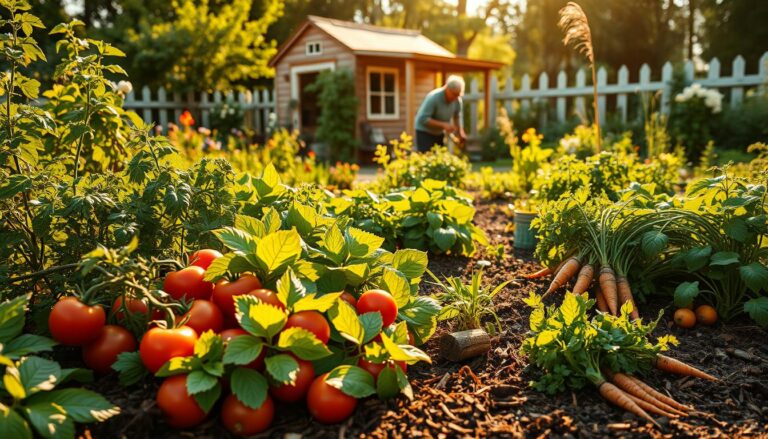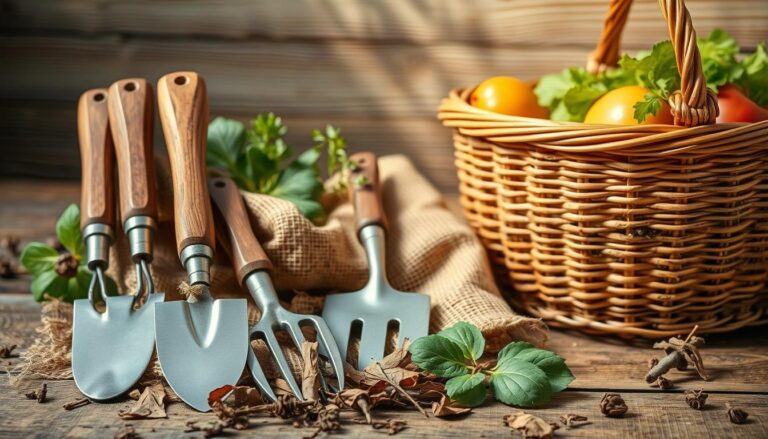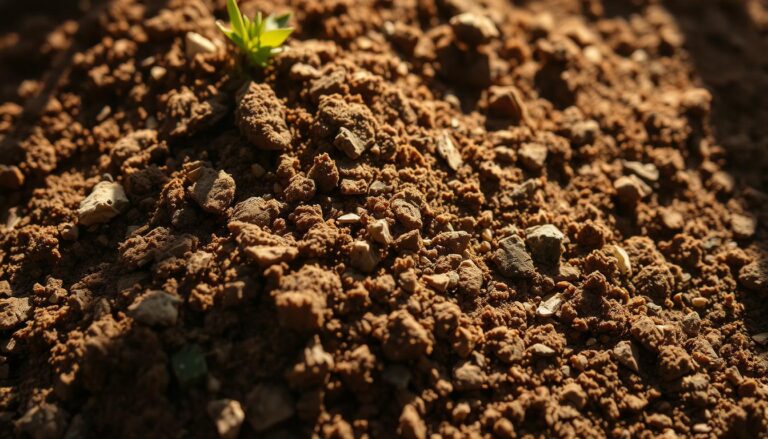Living sustainably is key, and eco-friendly gardening is crucial. By using organic gardening methods, we can lessen our impact on the planet.
Organic gardening is more than a hobby. It’s a way to help our planet. By not using synthetic fertilizers and pesticides, we protect wildlife and water. This not only benefits the environment but also secures a better future for all.
Choosing eco-friendly gardening is rewarding. It lets us grow our own food and support biodiversity. Small changes in gardening can make a big difference.
The Growing Movement Toward Earth-Friendly Gardening
More people are choosing earth-friendly gardening to lessen their environmental impact. This change comes from a growing awareness of the harm caused by traditional gardening. They want to use sustainable gardening practices instead.
Environmental Challenges of Conventional Gardening Methods
Traditional gardening often uses harmful chemicals. These can pollute water and harm animals. They also damage soil and contribute to climate change.
By switching to organic gardening, people can greatly reduce harm to the environment. Experts say, “using synthetic fertilizers and pesticides harms the environment a lot.” Lessening these chemicals is key to greener gardening.
The Expanding Organic Gardening Community in America
The organic gardening movement in America is growing fast. More folks see the natural gardening benefits and environmental benefits of organic gardening. It’s not just about individual gardens; it’s about making a bigger difference together.
Through sharing knowledge and resources, the organic gardening community is working towards a greener future.
Understanding Organic Gardening Benefits for the Environment
Organic gardening is a big step towards fixing our planet. It’s not just about growing plants. It’s about taking care of the whole ecosystem. By not using harmful chemicals, it makes our environment healthier.
What Makes Gardening Truly “Organic”?
Organic gardening uses natural stuff and methods that are good for the planet. It means using compost and manure to make soil better. It also means using smart ways to fight pests and diseases.
How Organic Methods Protect Local Ecosystems
Organic gardening keeps local ecosystems healthy. It helps keep a variety of plants and animals around. It also makes soil better and uses water wisely.
| Ecosystem Benefit | Organic Gardening Practice |
|---|---|
| Biodiversity Conservation | Planting a variety of crops and maintaining ecological balance |
| Soil Health Improvement | Using compost and manure to enrich soil |
| Water Conservation | Implementing efficient irrigation systems and mulching |
The Ripple Effect: Beyond Your Garden Fence
Organic gardening does more than just help your garden. It helps the whole planet. It reduces harmful chemicals, supports wildlife, and helps fight climate change.
In conclusion, organic gardening is a key way to protect our environment. By gardening organically, we can make a big difference. We can help our local ecosystems and work towards a greener future.
Nurturing Living Soil: The Foundation of Eco-Friendly Gardens
Creating a garden that works with nature starts with the soil. Healthy soil is full of life, from tiny organisms that help plants grow to insects that help the soil breathe. This mix of life is key for a strong garden.
Building Rich, Living Soil Without Chemicals
To make rich soil, use natural helpers like compost, manure, and green manure crops. These add to the soil’s health, making it better for plants and the tiny creatures that live there. Staying away from chemicals helps keep the soil’s balance and supports its ecosystem.
Effective strategies for enriching soil include:
- Composting kitchen and garden waste
- Incorporating cover crops into garden rotations
- Using organic mulches to retain moisture and suppress weeds
Preventing Erosion and Soil Degradation
Soil erosion is a big problem for gardens, leading to lost fertile soil and less growth. Using terraces, planting in lines, and keeping the soil covered with mulch or crops can stop erosion. This keeps the garden healthy for years to come.
How Organic Soils Capture and Store Carbon
Organic soils are important for the planet, helping to keep carbon out of the air. Adding compost and reducing how much we till the soil helps capture and store carbon. This helps fight climate change and makes the soil better for plants.
Measuring Your Garden’s Carbon Sequestration Impact
Gardeners can track how much carbon their soil stores by watching the organic matter over time. Simple steps like composting often and not tilling too much can help a lot. For more detailed info, talk to local experts or use online tools.
| Practice | Carbon Sequestration Potential | Additional Benefits |
|---|---|---|
| Composting | Moderate to High | Improves soil fertility and structure |
| Cover Cropping | High | Reduces erosion, enhances biodiversity |
| Reduced Tillage | Moderate | Less soil disturbance, retains moisture |
“Soil is the foundation of all life on Earth. By nurturing it, we nurture the future.” –
Protecting Our Precious Water Resources
Gardening organically is good for the soil and helps save our water. It reduces our environmental impact and makes our ecosystem healthier.
Eliminating Chemical Runoff into Waterways
Chemicals from regular gardening harm our waterways and the life in them. Organic gardening avoids these chemicals. This keeps our water clean and our ecosystems balanced.
Smart Water Conservation Techniques for Organic Gardens
Water conservation is key in organic gardening. Mulching, drip irrigation, and drought-resistant plants save water. They keep your garden healthy and growing.
Rainwater Harvesting Systems for Home Gardens
Rainwater harvesting saves water. It collects and stores rainwater, reducing the need for city water. This saves water and energy too.
- Reduces water bills
- Decreases stormwater runoff
- Provides a natural, chemical-free water source for plants
Safeguarding America’s Watersheds Through Organic Practices
Organic gardening protects our watersheds. It avoids harmful chemicals and saves water. Together, we can make a big difference for the environment.
Creating Havens for Biodiversity and Wildlife
Organic gardening is more than growing plants. It’s about supporting biodiversity and wildlife. By focusing on ecosystem health, gardeners help local wildlife and boost biodiversity.
Attracting and Supporting Essential Pollinators
Organic gardens are key for biodiversity by drawing pollinators. Pollinators like bees, butterflies, and hummingbirds are vital for many plants. To attract them, gardeners can:
- Plant a variety of flowers that are rich in nectar and pollen.
- Choose plants that are native to their region, as these are more likely to attract native pollinators.
- Avoid using pesticides, which can harm or kill pollinators.
Native Bee-Friendly Plants for American Gardens
Native bees are crucial for American ecosystems. To support them, consider planting:
- Sunflowers (Helianthus annuus), which provide a rich source of pollen.
- Zinnias (Zinnia spp.), which come in a variety of colors and are easy to grow.
- Goldenrod (Solidago spp.), often mistakenly blamed for causing allergies, but actually a valuable late-season nectar source.
Welcoming Birds and Beneficial Wildlife to Your Garden
Organic gardens also attract birds and beneficial insects. To welcome them, gardeners can:
- Provide food sources, such as bird feeders or berry-producing plants.
- Install water features, like birdbaths or small ponds, which can serve as a source of drinking water and a habitat for aquatic life.
- Create sheltered areas using native vegetation or brush piles.
Preserving Native Plant Heritage Through Organic Gardening
Keeping native plant species is vital for biodiversity. Organic gardening avoids harmful chemicals, protecting these plants. By growing native plants, gardeners preserve their region’s natural heritage and support local ecosystems.
Fighting Climate Change From Your Backyard
Organic gardening is more than just growing food or making your yard look nice. It’s a powerful way to fight climate change. By using earth-friendly gardening, you can cut down your carbon footprint and help the planet.
Reducing Your Garden’s Carbon Footprint
To fight climate change, start by making your garden greener. Use natural, local materials and cut down on machinery. Also, get efficient with your watering. The Environmental Protection Agency (EPA) says cutting energy use and emissions is key.
Building Climate-Resilient Garden Ecosystems
With climate change, weather gets wilder. Your garden needs to be tough. Organic gardening, like rotating crops and composting, makes a strong ecosystem. A study found that diversity is crucial for a garden’s strength.
How Organic Gardens Help Cool Urban Heat Islands
Urban heat islands are a big problem in cities. They get hotter because of all the built-up areas. Organic gardens help by cooling the air through evapotranspiration. Urban planning expert Jane Jacobs said,
“The most successful cities are those that have a mix of uses and a high level of diversity, including green spaces.”
Adding organic gardens to cities makes them cooler and more livable.
Breaking Free From Chemical Dependence
Organic gardening is a great way to protect our planet and support biodiversity. It helps gardeners leave a smaller environmental footprint.
The Hidden Environmental Costs of Synthetic Garden Products
Synthetic garden products, like fertilizers and pesticides, harm the environment. They pollute soil, water, and air, hurting beneficial insects and wildlife. The use of these chemicals can cause long-term ecological damage, affecting gardens and ecosystems.
Effective Natural Alternatives for Garden Management
There are natural alternatives to synthetic garden products. Composting enriches soil without chemicals, and companion planting naturally keeps pests away. These methods cut down on chemical use and support a balanced ecosystem.
DIY Organic Solutions for Common Garden Problems
Making your own organic gardening solutions is easy and fulfilling. For instance, a soap and water mix can fight aphids, and baking soda and water can combat fungal diseases. These DIY solutions are eco-friendly and save money.
- Use neem oil to control a wide range of pests.
- Apply diatomaceous earth to deter slugs and snails.
- Make a compost tea to nourish your plants.
Creating Safe Spaces for People, Pets, and Wildlife
Organic gardening makes safe spaces for people, pets, and wildlife. It protects the environment and promotes community health. Organic gardens can be sanctuaries for local wildlife, giving them the resources to thrive.
Sustainable Resource Management in Your Organic Garden
Organic gardening is more than avoiding chemicals. It’s about managing resources well to create a balanced garden. By using sustainable practices, gardeners can lessen their environmental impact. They also make their gardens healthier and more productive.
Closing the Loop: Composting and Garden Waste Recycling
Composting is key in sustainable gardening. It turns waste into something valuable. By composting, gardeners cut down on landfill waste, improve soil, and feed plants.
To compost well, mix ‘green’ materials (like kitchen scraps) with ‘brown’ materials (like dried leaves). This makes a compost full of nutrients.
Energy-Efficient Garden Design and Maintenance
Designing an energy-efficient garden means planning smart. It’s about using less water and fertilizers. Choose plants that don’t need much water and use efficient irrigation systems.
Also, use mulch to keep soil moist. Regular tasks like pruning and weeding help too. They cut down on the need for more water and fertilizers.
Sustainable Material Choices for Garden Structures
The materials you choose for garden structures matter a lot. Using recycled, sustainable, or local materials helps the environment. For example, reclaimed wood for beds or gravel for paths adds beauty and reduces waste.
Community Impact: Expanding Your Garden’s Environmental Influence
Organic gardening can lead to a big change in how we live. It not only makes our surroundings better but also helps the whole community. This movement is all about living in a way that’s good for the planet.
Inspiring Neighbors and Building Local Garden Communities
Organic gardening helps bring people together. By sharing what we know, we can inspire others. This creates strong, local garden communities.
Community gardens are places where we learn, work together, and meet new people. They make us feel like we belong.
| Benefits of Community Gardens | Description |
|---|---|
| Education | Workshops and training on organic gardening practices |
| Collaboration | Sharing resources and expertise among gardeners |
| Social Interaction | Building relationships and a sense of community |
Supporting Local Seed Saving and Exchange Networks
Helping local seed saving and exchange networks is another way to make a difference. These efforts keep our food diverse and available. They also let gardeners try new things, making our food systems stronger.
“Seed saving is an act of resistance against the industrial food system. It’s a way of preserving our agricultural heritage and ensuring food sovereignty.” –
Participating in Citizen Science Through Organic Gardening
Organic gardeners can also join citizen science projects. These projects help us understand how gardening affects our environment. By taking part, we help scientists make better choices for our planet.
Conclusion
Organic gardening has many benefits for our planet. It helps protect local ecosystems and fights climate change. By using eco-friendly gardening, we can make a big difference.
Practices like nurturing soil, saving water, and supporting biodiversity are key. They make our gardens beautiful and productive. They also help create a better future.
Choosing organic gardening means you’re part of a group working to save nature. Every garden helps, and together we can make a big change. We hope you’ll keep learning and sharing sustainable gardening ideas. Let’s work together for a greener tomorrow.
FAQ
What is organic gardening, and how does it benefit the environment?
How does organic gardening help in protecting local ecosystems?
Can organic gardening really make a difference in combating climate change?
How can I start an organic garden if I’m new to gardening?
What are some effective natural alternatives to synthetic garden products?
How does organic gardening contribute to water conservation?
Can organic gardening help support local biodiversity and wildlife?
What role does composting play in sustainable gardening practices?
How can I measure the environmental impact of my organic garden?

Sortemdia nasceu com o propósito de trazer alegria e oportunidades para todos por meio de sorteios gratuitos de prêmios incríveis. O site tem como missão oferecer experiências acessíveis, divertidas e justas para quem deseja concorrer a produtos, serviços e brindes sem pagar nada por isso. Acreditamos que a sorte pode bater à porta de qualquer pessoa — e no Sortemdia, ela pode chegar com apenas um clique.



